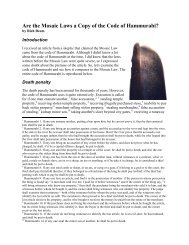Coming to Grips with the Early Church Fathers - Evidence for God ...
Coming to Grips with the Early Church Fathers - Evidence for God ...
Coming to Grips with the Early Church Fathers - Evidence for God ...
You also want an ePaper? Increase the reach of your titles
YUMPU automatically turns print PDFs into web optimized ePapers that Google loves.
<strong>Coming</strong> <strong>to</strong> <strong>Grips</strong> <strong>with</strong> <strong>the</strong> <strong>Early</strong> <strong>Church</strong> Fa<strong>the</strong>rs’ Perspective on Genesis John Millam<br />
days. 18 (A detailed discussion of <strong>the</strong> fourth creation day and its implications <strong>for</strong> <strong>the</strong> days<br />
of creation can be found in chapter 7 of A Matter of Days by Hugh Ross.)<br />
2. Genesis 2:4. This verse uses <strong>the</strong> words “in <strong>the</strong> day” (KJV) <strong>to</strong> summarize all of <strong>the</strong><br />
preceding events described in Genesis 1. This usage seems <strong>to</strong> equate <strong>the</strong> “six days” of<br />
Genesis 1 <strong>with</strong> a single day, which caused considerable confusion in <strong>the</strong> early church.<br />
One way that some fa<strong>the</strong>rs resolved this apparent contradiction was <strong>to</strong> view <strong>the</strong> days as<br />
being instantaneous periods. 19 Today, we understand “in <strong>the</strong> day” in this verse <strong>to</strong> refer <strong>to</strong><br />
an indeterminate period of time (covering all <strong>the</strong> events of Genesis 1) and, <strong>the</strong>re<strong>for</strong>e,<br />
longer than 24 hours.<br />
3. Seventh day is not closed out. Each of <strong>the</strong> first six days is closed out <strong>with</strong> <strong>the</strong> phrase,<br />
“And <strong>the</strong>re was evening, and <strong>the</strong>re was morning—<strong>the</strong> X-th day” (NIV). This phrase is<br />
conspicuously absent from <strong>the</strong> seventh creation day, which indicates this “day” is still<br />
ongoing and so spans a time much longer than an ordinary solar day. 20 Psalm 95:11 and<br />
Hebrews 4:1–11 fur<strong>the</strong>r support <strong>the</strong> idea that we are still in <strong>the</strong> seventh day. 21 At a<br />
minimum, this contradicts a simple calendar-day view where each day is a natural day.<br />
So what are we <strong>to</strong> conclude from this? First, <strong>the</strong> fa<strong>the</strong>rs who used allegorical interpretation did<br />
have at least three significant scriptural reasons <strong>for</strong> rejecting a calendar-day interpretation.<br />
Second, it was issues like <strong>the</strong>se three that led <strong>the</strong>m <strong>to</strong> read Genesis allegorically because a<br />
calendar-day view seemed impossible <strong>to</strong> <strong>the</strong>m. Third, recognition that <strong>the</strong> days of creation need<br />
not—or even should not—be unders<strong>to</strong>od as simple solar days is a tradition going back as far as<br />
Philo in <strong>the</strong> first century.<br />
Hermeneutics in <strong>the</strong> <strong>Early</strong> <strong>Church</strong><br />
Now let’s consider those whom Mook has deemed “literalists,” namely Lactantius, Vic<strong>to</strong>rinus,<br />
Ephrem <strong>the</strong> Syrian, and Basil. 22 Mook asserts <strong>the</strong>se four taught that <strong>the</strong> creation days were<br />
normal 24-hour days. So, if <strong>the</strong>se fa<strong>the</strong>rs interpreted Genesis “literally,” <strong>the</strong>n does that mean<br />
<strong>the</strong>ologians <strong>to</strong>day should interpret it <strong>the</strong> same way?<br />
Over <strong>the</strong> last decade, both young-earth and old-earth creationists have written many books and<br />
articles purporting <strong>to</strong> demonstrate how <strong>the</strong> patristics support <strong>the</strong>ir own creation view. Typically,<br />
both camps present <strong>the</strong> ancient leaders’ interpretations as isolated quotes or simplistic<br />
caricatures. This tactic makes everything seem so neat and clear. Reading <strong>the</strong> original writings in<br />
<strong>the</strong>ir entirety, however, completely shatters overly simplistic understandings of <strong>the</strong> church<br />
fa<strong>the</strong>rs. Studying <strong>the</strong>se august figures in <strong>the</strong>ir original his<strong>to</strong>rical context is critical <strong>to</strong> piecing<br />
<strong>to</strong>ge<strong>the</strong>r a more complete picture of what <strong>the</strong>y believed and, more importantly, <strong>to</strong> understanding<br />
how <strong>the</strong>y arrived at <strong>the</strong>ir conclusions.<br />
18. Philo, Allegorical Interpretations 1.2; Who Is <strong>the</strong> Heir of Divine Things 34. Origen, Against Celsus 6. 60–61;<br />
First Principles 4.1.16. Augustine, Literal Interpretation of Genesis 4.26.43, in The Patristic Understanding of<br />
Genesis, eds. William A. Dembski, Wayne J. Downs, and Fr. Justin B. A. Frederick (Riesel, TX: Erasmus Press<br />
2008), 428.<br />
19. Philo, Allegorical Interpretations 1.8; Questions and Answers in Genesis 1.1. Clement of Alexandria<br />
Miscellaneous 6.16. Origen, Against Celsus 6.50, 60. Augustine, Literal Interpretation of Genesis 4.27.44.<br />
20. Origen, Against Celsus 5.59; 6.61. Augustine, Confessions 13.51.<br />
21. Hugh Ross, A Matter of Days, (Colorado Springs: NavPress, 2004), 81–83.<br />
22. James Mook, “The <strong>Church</strong> Fa<strong>the</strong>rs on Genesis, <strong>the</strong> Flood, and <strong>the</strong> Age of <strong>the</strong> Earth,” in Terry Mortenson and<br />
Thane H. Ury, eds., <strong>Coming</strong> <strong>to</strong> <strong>Grips</strong> <strong>with</strong> Genesis (Green Forest, AR: Masters Books, 2008), 29–32.<br />
Page 7 <strong>Evidence</strong> <strong>for</strong> <strong>God</strong> from Science






